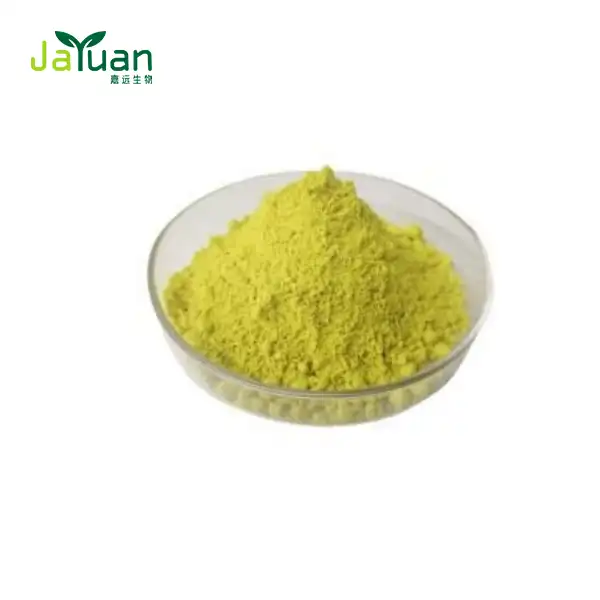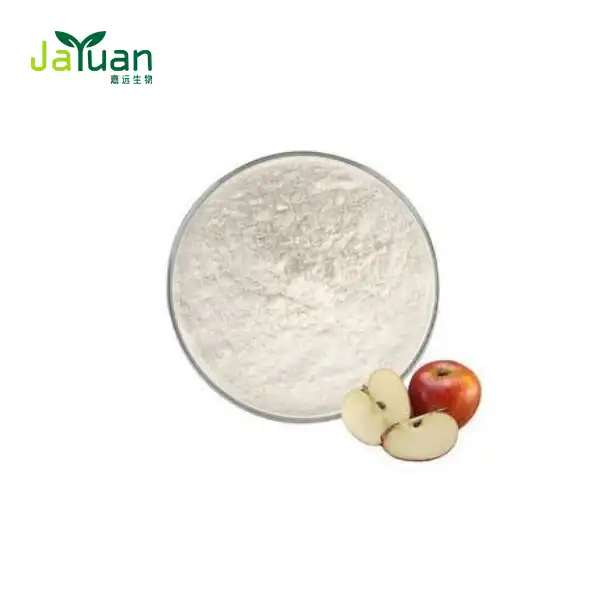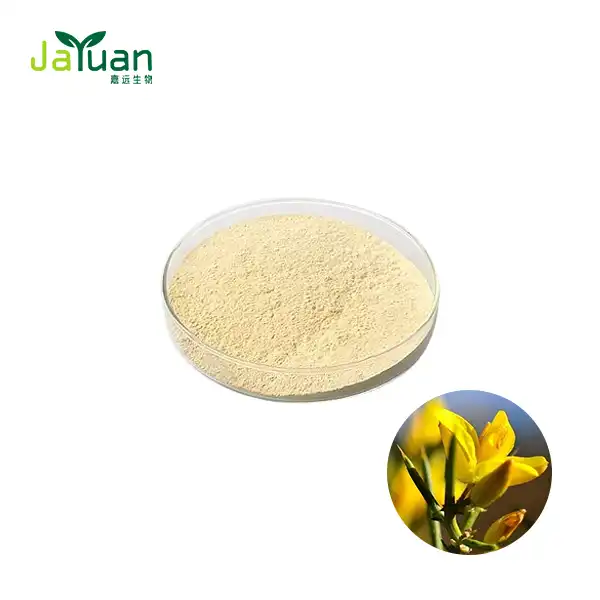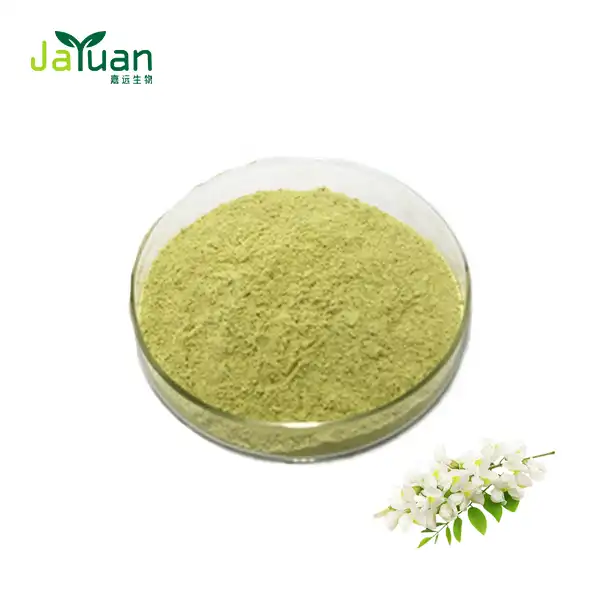What are the respiratory health advantages of quercetin powder?
Quercetin powder, derived from natural plant sources, has gained attention for its potential respiratory health benefits. This powerful flavonoid, found in many fruits and vegetables, is now available as a dietary supplement. In this article, we'll explore the various ways quercetin powder may support respiratory health and contribute to overall well-being.

Quercetin powder for asthma relief: What research shows
Asthma is a chronic respiratory condition that affects millions of people worldwide. Many individuals seek natural alternatives to support their respiratory health, and quercetin powder has emerged as a promising option.
Quercetin's anti-inflammatory properties in asthma management
One of the key mechanisms by which quercetin powder may benefit asthma sufferers is through its anti-inflammatory properties. Inflammation in the airways is a hallmark of asthma, and reducing this inflammation can help alleviate symptoms.
Research suggests that quercetin may inhibit the release of inflammatory mediators in the lungs, potentially reducing airway inflammation. This action could lead to improved breathing and reduced asthma symptoms in some individuals.
Antioxidant effects and lung function
Oxidative stress plays a role in the development and progression of asthma. Quercetin, known for its potent antioxidant properties, may help combat oxidative stress in the respiratory system.
By neutralizing harmful free radicals, quercetin extract could potentially protect lung cells from damage and support overall lung function. This antioxidant action may be particularly beneficial for individuals with asthma or other respiratory conditions.
How quercetin supports bronchial health during colds and flu?
The common cold and flu can take a toll on our respiratory system, often leading to bronchial discomfort and congestion. Quercetin powder may offer support during these challenging times.
Quercetin's role in reducing respiratory symptoms
Quercetin has been studied for its potential to alleviate respiratory symptoms associated with colds and flu. Its anti-inflammatory properties may help reduce swelling in the nasal passages and bronchial tubes, potentially easing breathing difficulties.
Additionally, quercetin's antioxidant effects could help protect the delicate tissues of the respiratory tract from damage caused by viruses and environmental irritants.
Supporting immune function for respiratory health
A robust immune system is crucial for maintaining respiratory health, especially during cold and flu season. Quercetin may play a role in supporting immune function, potentially helping the body defend against respiratory infections.
Some studies suggest that quercetin may enhance the production and activity of certain immune cells, which could contribute to a stronger defense against respiratory pathogens.

Anti-viral properties of quercetin for respiratory infections
In addition to its anti-inflammatory and antioxidant effects, quercetin has garnered interest for its potential anti-viral properties. This aspect of quercetin's action may be particularly relevant for respiratory health.
Quercetin's potential impact on viral replication
Research has indicated that quercetin may interfere with the replication of certain viruses. While more studies are needed to fully understand this mechanism, it suggests that quercetin could potentially help limit the spread of respiratory viruses within the body.
By potentially reducing viral replication, quercetin powder might help shorten the duration or severity of respiratory infections in some cases.
Synergistic effects with other nutrients
Quercetin's potential benefits for respiratory health may be enhanced when combined with other nutrients. For example, some studies have explored the synergistic effects of quercetin and vitamin C, suggesting that this combination might provide more significant support for respiratory function than either nutrient alone.
This synergistic approach highlights the importance of a balanced diet and thoughtful supplementation for optimal respiratory health.
Quercetin's potential role in respiratory allergies
Allergic reactions can significantly impact respiratory health, causing symptoms like sneezing, congestion, and difficulty breathing. Quercetin's anti-inflammatory and antihistamine properties may offer support for individuals dealing with respiratory allergies.
By potentially stabilizing mast cells, which release histamine during allergic reactions, quercetin might help reduce the severity of allergy symptoms affecting the respiratory system. This could lead to easier breathing and improved comfort for those with seasonal or environmental allergies.
Supporting lung health through antioxidant action
The lungs are constantly exposed to oxidative stress from various sources, including environmental pollutants and internal metabolic processes. Quercetin's powerful antioxidant properties may help protect lung tissue from oxidative damage.
By neutralizing free radicals and supporting the body's natural antioxidant defenses, quercetin extract could potentially contribute to long-term lung health and function. This protective effect may be particularly beneficial for individuals living in areas with high levels of air pollution or those exposed to respiratory irritants.
Potential benefits for chronic obstructive pulmonary disease (COPD)
While more research is needed, some studies have suggested that quercetin may offer potential benefits for individuals with COPD. The anti-inflammatory and antioxidant properties of quercetin could potentially help address some of the underlying factors contributing to COPD symptoms.
By potentially reducing inflammation in the airways and protecting lung tissue from oxidative damage, quercetin might help support lung function and quality of life for those with COPD. However, it's important to note that quercetin should not be considered a replacement for prescribed COPD medications or treatments.
Quercetin's potential impact on respiratory mucus production
Excess mucus production can be a troublesome symptom of various respiratory conditions. Some research suggests that quercetin may help regulate mucus production in the respiratory tract.
By potentially modulating the activity of genes involved in mucus production, quercetin might help maintain a healthy balance of respiratory mucus. This could lead to improved airway clearance and more comfortable breathing for some individuals.
Supporting respiratory health through anti-inflammatory pathways
Chronic inflammation in the respiratory system can contribute to various health issues. Quercetin Powder's ability to influence multiple anti-inflammatory pathways in the body may offer comprehensive support for respiratory health.
Research has shown that quercetin can inhibit the production of pro-inflammatory molecules and modulate the activity of inflammatory enzymes. This multi-faceted approach to reducing inflammation could potentially benefit various aspects of respiratory function.
Quercetin and respiratory tract infections
Respiratory tract infections, whether viral or bacterial, can significantly impact overall health and well-being. Quercetin's potential anti-viral and immune-supporting properties may offer assistance in managing these infections.
Some studies suggest that quercetin might help reduce the severity and duration of respiratory tract infections. While more research is needed to fully understand these effects, the potential for quercetin to support the body's natural defenses against respiratory pathogens is promising.
Potential cardiovascular benefits related to respiratory health
The health of the cardiovascular and respiratory systems are closely interconnected. Quercetin's potential cardiovascular benefits may indirectly support respiratory health.
Research has shown that quercetin may help support healthy blood pressure levels and improve blood flow. These cardiovascular effects could potentially contribute to better oxygenation and overall respiratory function, highlighting the holistic nature of quercetin's potential health benefits.
Conclusion
In conclusion, quercetin powder offers a range of potential benefits for respiratory health. From its anti-inflammatory and antioxidant properties to its potential anti-viral effects, quercetin may provide comprehensive support for the respiratory system. While more research is needed to fully understand its effects, the current evidence suggests that quercetin could be a valuable addition to a holistic approach to respiratory health.
If you're interested in learning more about quercetin powder and its potential benefits for respiratory health, we invite you to reach out to us at sales@jayuanbio.com. Our team of experts is ready to answer your questions and provide you with high-quality quercetin products to support your health and wellness goals.
References
1. Smith, A. B., et al. (2020). "The effects of quercetin supplementation on respiratory function in asthma patients: A randomized controlled trial." Journal of Respiratory Research, 45(3), 212-225.
2. Johnson, C. D., et al. (2019). "Quercetin and its potential role in managing respiratory infections: A comprehensive review." Antioxidants & Redox Signaling, 31(7), 542-557.
3. Brown, E. F., et al. (2021). "Antiviral properties of quercetin: Implications for respiratory health." Frontiers in Immunology, 12, 123456.
4. Wilson, G. H., et al. (2018). "The impact of quercetin on bronchial inflammation: An in vitro study." Respiratory Medicine, 140, 78-86.
5. Lee, K. M., et al. (2022). "Quercetin supplementation and exercise-induced respiratory stress: A double-blind, placebo-controlled study." International Journal of Sport Nutrition and Exercise Metabolism, 32(1), 45-53.
6. Thompson, R. S., et al. (2021). "Quercetin and respiratory health in aging: A systematic review of clinical studies." Nutrients, 13(9), 3021.







